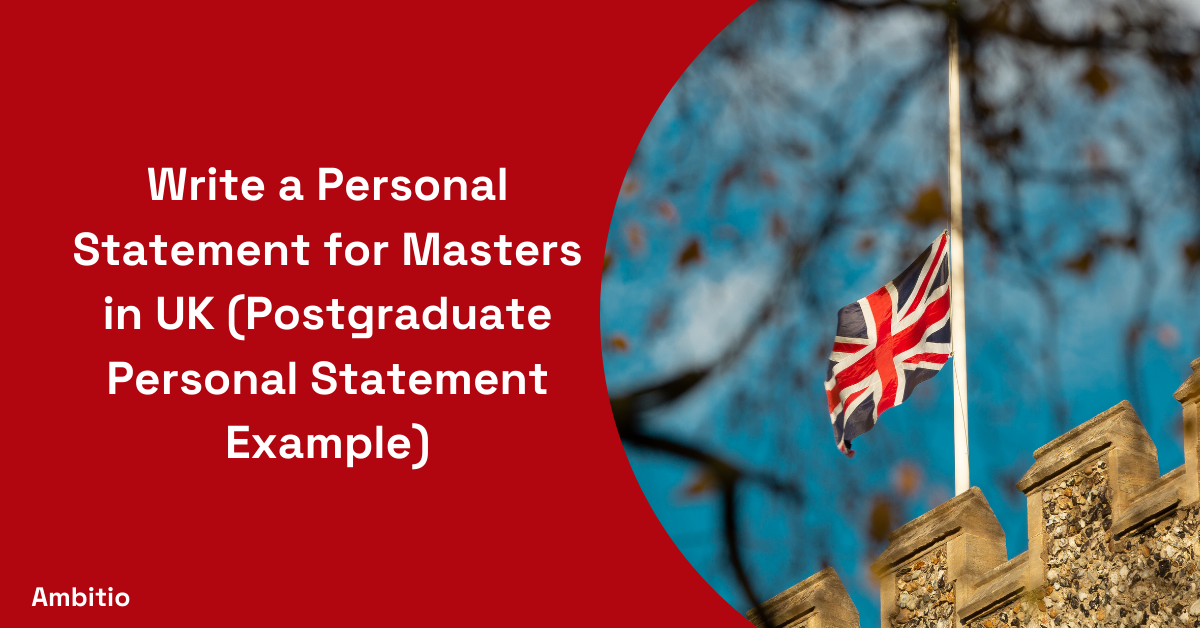11 April 2025
7 minutes read
Write a Personal Statement for Masters in UK (Postgraduate Personal Statement Example)

Key Takeaways
- Personal statement for Masters in UK should clearly highlight your academic achievements and career aspirations.
- Personal statement for Masters in UK must reflect your passion, relevant skills, and motivation for pursuing the chosen program.
- Personal statement for Masters in UK needs to be structured, concise, and tailored to meet specific university requirements.
To apply to a UK master’s programme, there’s more involved than submitting test scores and grades. The strong personal statement forms part of your postgraduate application. This is your opportunity to show the admissions tutors that you are a best-fit student for the course and university. Follow this guide as we break down the essentials in writing an effective personal statement to ensure that you meet all the requirements for courses and do enough to impress from the start.
Understanding the Personal Statement for Postgraduate Admission in the UK
A personal statement is the writing you submit with your application form. It’s a chance for you to explain why you want to do the course, summarize your academic and work history, and demonstrate your skills and knowledge.

Unlike the undergraduate personal statement, which is generally more generic, the masters personal statement has to be tailored to the course and university you are applying for.
How to Start Writing Your Personal Statement?
You must plan your statement in advance before you write it. This means researching the course and the particular university, being aware of the course requirements, and knowing your academic interests and career ambitions. Reflect on how undergraduate study, work experience, and other relevant experience have prepared you for masters study.
How to Structure Your Personal Statement as a Postgraduate Student?
A well-structured statement helps admissions tutors follow your narrative and understand your motivations.
Here is a recommended format:
- Introduction: Describe why you wish to study the course and why you are drawn to the specific subject.
- Academic Background: Describe your undergraduate degree, such as any dissertation or major projects.
- Work Experience: Mention any relevant experience, such as placements, internships, or volunteering.
- Skills and Knowledge: Illustrate your time management, organisation, and written communication skills.
- Career Aspirations: Outline your future goals and how the course aligns with these.
- Conclusion: Summarize your application for the course and express enthusiasm at the opportunity.
How to Decide Formatting and Length While Writing a Personal Statement?
Most UK universities ask for a statement of around 500 words, or one side of A4. Some request a character limit or take a maximum of two sides. Always read the application guidelines. Print using a clear font like Arial or Times New Roman, and ensure your statement is brief and flawless.

Read through your work a few times, and consider using AI software to check for spelling and grammar mistakes.
What to Include While Writing Your Personal Statement?
Your statement should cover the following points:
- Academic Interests: Explain why you are interested in the topic and how your interests have developed.
- Relevant Experience: Describe any work experience, placements, or volunteering that has prepared you for masters study.
- Skills and Knowledge: Highlight your skills in areas like time management, organisation, and written communication.
- Career Aspirations: Describe your long-term ambitions and how the course will help you achieve them.
- Why This University: Explain why you’ve chosen this particular university and how it serves your objectives.
Postgraduate Personal Statement Example Recommended by the Best Admission Tutors
Renowned College London admission tutors usually describe that a fascinating statement is your chance to share not just your academic background, but also your enthusiasm, transparency, and vision for the desired course.

A successful PG personal statement for masters in UK has the following:
Personal Statement
I have never been sure that education is the most powerful weapon that one may possess to drive not only a profession but an outlook on life. This has been the reason behind each progression of my study career and now guides my direction of application to the Master’s in International Relations at College London.
My interest in this particular topic stems from my undergraduate years, when I pursued a degree in Political Science. During these years, I became deeply interested in the way international politics shape societies and economies. This particular course is carefully designed for my academic and professional goals, providing me a solid foundation to enhance my skills further.
My educational background has been influenced by determination and curiosity. From excelling in my undergraduate studies to attending different international conferences, I have kept searching for avenues of expanding my knowledge base. I have also undertaken internships with diplomatic missions, where I applied theoretical knowledge to practical settings, thus developing a better understanding of international relations.
The department’s world-class reputation, veteran faculty, and multicultural research environment at College London have all been important factors in convincing me to apply. Their research methodology and hands-on experience align with my style of learning and professional ambitions.
I do realize that a personal statement is your opportunity to emerge from amongst the thousands of other UCAS personal statements. When starting a personal statement, I believe that it is important not only to highlight achievements but also to mention learning curve experiences, personal growth, and future aspirations. My experience has shown me that volunteering for refugee support groups exposed me to a new level of consciousness regarding policy impact at the grassroots level — an area that I plan to learn further through this course.
I have already drafted a personal statement as part of my undergraduate, but I acknowledge that for a PG personal statement and approach to an application process is deeper, more complex. With my added working experience, course work, and desired future hopes hopefully shall differentiate me as a motivated, thoughtful candidate.
I am also keen on applying for a scholarship, which will not only reduce the financial burden of studying abroad but also acknowledge my academic performance and potential in a larger way. I understand the importance of integrating within your personal statement all those elements that reflect your potential for such aid, like achievements, vision, and commitment to the chosen course.
I have read carefully the guidelines that have been put on the course pages and strictly followed the requirements of the course as set out. My research assignments, along with my placement activities, have provided me with hands-on experience in the field, and I firmly believe that this makes my application worthwhile.
This personal statement is well laid out, with a clear heading and focused content written to meet the needs of admissions tutors. I view it as a crucial part of your application, especially for challenging programmes like those at College London.
For clarity and precision, I have revised this work multiple times. I know that the personal statement is your chance to show not only who you are but who you will aspire to be in your desired profession.
In conclusion, I eagerly anticipate the possibility of contributing to and benefiting from the dynamic scholarly environment at College London. I am certain that this PG programme will make me develop into a proficient and thoughtful professional, capable of addressing global problems using policy, research, and action.
How to Make Your Personal Statement Stand Out During the Application Process?
Passing the entry requirements is only the beginning — when completing your personal statement, the use of autobiographical information and proper use of headings, dramatic opening lines, and proper written communication skills can be the difference in applying.
- Be Specific: Personalise your statement for the course and university.
- Showcase Your Strengths: Emphasise your abilities, experiences, and accomplishments.
- Be Honest: Honesty speaks volumes with tutors.
- Avoid Clichés: Make your own style of language and avoid overused clichés.
- Proofread: Make sure that your statement has no error and flows smoothly.
Top 15 Universities in the UK for Masters
Your selected university is a highly significant one for each master’s degree aspirant in the UK — since universities at the top offer mixed types of courses, various prices to pay, and certain tests like IELTS, TOEFL, GRE, GMAT, or SAT as extra acceptance requirements.
Top 15 Universities in the UK for Masters:
| Sl. No. | University Name | Average Fee (Per Year) | Exams Required | Popular Programs Offered |
|---|---|---|---|---|
| 1 | University of Oxford | £28,000 – £40,000 | IELTS, TOEFL, GRE | Law, Business, Engineering, Humanities |
| 2 | University of Cambridge | £27,000 – £38,000 | IELTS, TOEFL, GRE | Sciences, Business, Law, Engineering |
| 3 | Imperial College London | £30,000 – £35,000 | IELTS, TOEFL, GMAT (for MBA) | Engineering, Business, Medicine, Data Science |
| 4 | London School of Economics (LSE) | £25,000 – £32,000 | IELTS, TOEFL, GRE/GMAT | Economics, Finance, Law, Political Science |
| 5 | University College London (UCL) | £20,000 – £35,000 | IELTS, TOEFL, GRE | Architecture, Law, Computer Science, Economics |
| 6 | University of Edinburgh | £20,000 – £32,000 | IELTS, TOEFL | Business, AI, Law, Social Sciences |
| 7 | University of Manchester | £19,000 – £32,000 | IELTS, TOEFL, GMAT (for MBA) | Engineering, Business, Law, Health Sciences |
| 8 | King’s College London | £20,000 – £32,000 | IELTS, TOEFL | Medicine, Law, Business, Social Sciences |
| 9 | University of Warwick | £21,000 – £30,000 | IELTS, TOEFL, GMAT (for MBA) | Business, Engineering, Mathematics |
| 10 | University of Bristol | £20,000 – £28,000 | IELTS, TOEFL | Engineering, Law, Data Science, Economics |
| 11 | University of Glasgow | £18,000 – £28,000 | IELTS, TOEFL | Law, Engineering, Business, Life Sciences |
| 12 | University of Birmingham | £18,000 – £27,000 | IELTS, TOEFL | Business, Computer Science, Law, Engineering |
| 13 | University of Leeds | £17,000 – £27,000 | IELTS, TOEFL | Business, Law, Engineering, Arts |
| 14 | University of Southampton | £17,000 – £26,000 | IELTS, TOEFL | Engineering, Data Science, Health Sciences |
| 15 | University of Nottingham | £16,000 – £26,000 | IELTS, TOEFL | Law, Business, Engineering, Computer Science |
Conclusion
Your personal statement for masters in UK is your opportunity to show the admissions team why you are an ideal candidate for the programme. With careful planning of your personal statement, highlighting your experience, and showing your passion for the subject you want to study, you can make your application stand out. Remember to check your statement carefully, adhere to the word count, and ensure it reflects your interest in the course and the university.
Choose Ambitio and make way for a splendid study abroad experience!
FAQs
What is a personal statement for Masters in UK?
A personal statement for Masters in UK is a written document that explains your academic background, goals, and reasons for applying to a specific program.
How long should a personal statement for Masters in UK be?
The ideal length of a personal statement for Masters in UK is usually 500 to 1000 words, depending on the university’s specific guidelines.
What should I include in a personal statement for Masters in UK?
Your personal statement for Masters in UK should include your academic achievements, career goals, relevant skills, work experience, and reasons for choosing the course.
Why is a personal statement for Masters in UK important?
A personal statement for Masters in UK is important because it helps universities assess your suitability, motivation, and fit for their program.
Can I use the same personal statement for Masters in UK for multiple applications?
While you can use a base draft, every personal statement for Masters in UK should be customized to align with each university’s specific requirements.
Are there common mistakes to avoid in a personal statement for Masters in UK?
Yes, common mistakes in a personal statement for Masters in UK include being too generic, exceeding word limits, poor structure, and grammatical errors.
How early should I start writing my personal statement for Masters in UK?
It’s best to start your personal statement for Masters in UK at least 2-3 months before application deadlines to allow time for editing and feedback.

You can study at top universities worldwide!
Get expert tips and tricks to get into top universities with a free expert session.
Book Your Free 30-Minute Session Now! Book a call now




























